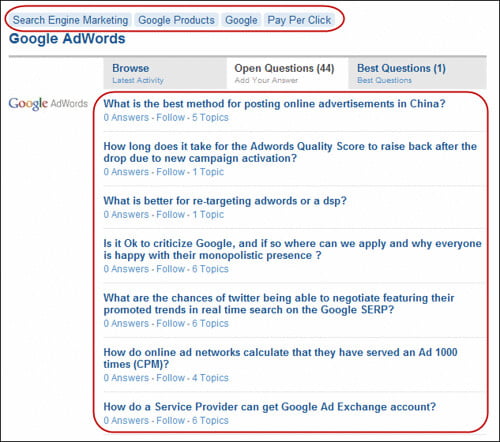Quora SEO: How to Use Quora if You’re an SEO
If you’re not familiar with it, Quora is a relatively new question and answer site. It’s much-hyped and has a huge following within the tech/startup community, and features participation from well-known entreprenuers, angel investors, and venture capitalists. There’s some debate about how scalable the site is, how useful and interesting it is to people outside this initial niche, etc.
We won’t focus on any of that or on the basic mechanics of asking a question on Quora here — what I want to talk about is two interesting ways an SEO can use Quora.
1. Find Content Topic Ideas for Tech-Oriented Content
This is really true of any Q and A site, but if you can find a niche with some activity, Quora is a great way to find content topic ideas. Let’s say I’m looking to build out an editorial calendar for the WordStream blog so that everyone can drive Elisa crazy missing their deadlines and ignoring the proposed topics. I can go to Quora and find some interesting content ideas:
Just by starting a search for AdWords in the omnipresent search bar on the site we get some interesting ideas. “How many people advertise on AdWords” is a particularly interesting query. We can take things a step further, though, and drill down into the Google AdWords topic to get at some even richer content.
Once I click through, I can take a look at all of the “open questions”:
This is interesting because these are questions that people are asking, but that no one has produced a good answer for: demand without supply = opportunity. I can take a peak at this list (here we see 44 unanswered questions) and pull together all the questions that myself or anyone else authoring content for the blog could answer. We also see the handy related sections such as Google, Pay Per Click, etc. These are good opportunities to find more open questions and add them to our content plan.
Once we’ve finalized on topics, we’ll want to add a layer of research to our topic selection: keyword research. Having found some questions that we know people are looking for that we know we can answer, we now want to make sure we’re connecting with as many of the people looking for this answer as possible. Find the right keywords using your favorite keyword research tool and apply them to your title tag to draw in the maximum amount of traffic available.
2. Follow Google Engineers (And Former Google Engineers!)
Everyone in the search marketing community hangs on Matt Cutts‘ every word, but he works for Google and is effectively a PR representative for them. One of the unique things about Quora that’s interesting to an SEO is that it attracts a lot of engineers and early adopters — some of whom currently or used to work for Google.
During the whole Bing Google who copied who controversy there was a great thread that Edmund Lau, a former Google Search engineer, participated in and he shared some very interesting information. Following Google engineers and, better yet, former Google engineers who worked on various search products on Quora lets you see how they answer questions around search results. This gives you a more diverse (and less experienced/polished) set of voices around what Google is doing, thinking, and where the search product is going. It’s actually rather difficult to find people you aren’t connected with via FaceBook or Twitter on Quora at the moment, but you can find a nice list of Google employees on Quora within a very comprehensive “unofficial directory” of tech people on Quora.
By leveraging Quora to get content ideas and learn more about how people at Google think about their search product, you can get some actual SEO value out of Quora even if they no-follow your external links.










Comments
Please read our Comment Policy before commenting.